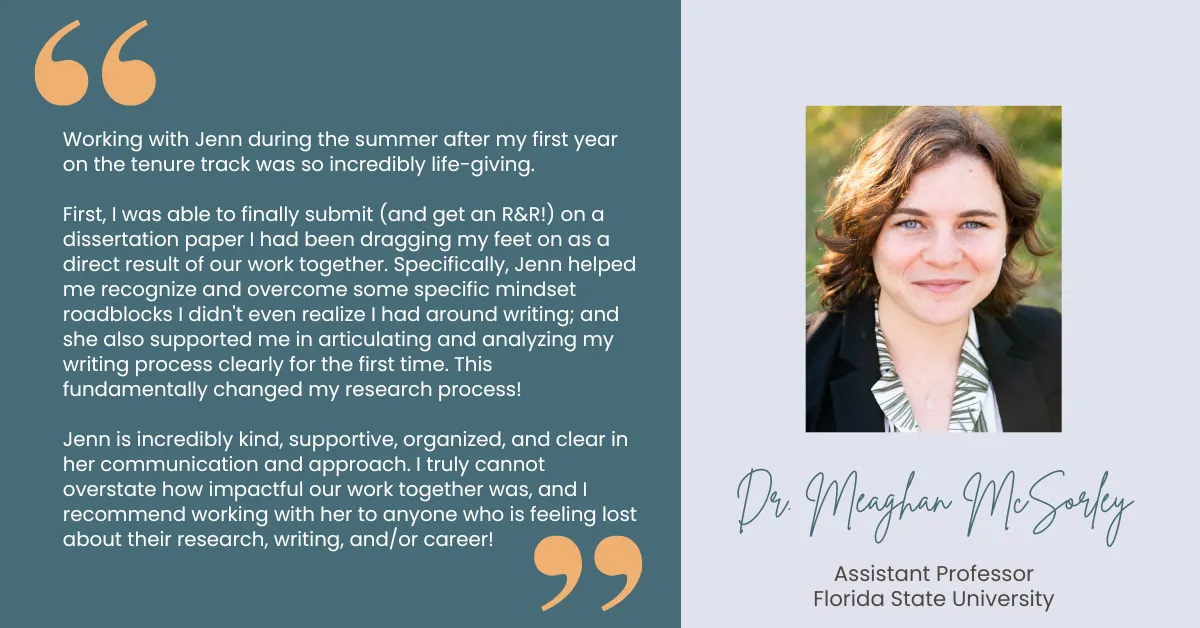April 2025 PNP Roundup
Last Month in Review

Greetings, dear readers!
This month marks a full year since I stepped away from my academic post and took the leap into building my own business as a scholarpreneur. I’ve been reflecting on just how much has changed—and how deeply grateful I am for the trust you’ve placed in me during this season of growth.
To my clients, students, and readers: thank you. It has been a true joy to support your writing, your work, and your well-being. I appreciate the trust and camaraderie you’ve granted me. Ours is a beautifully reciprocal relationship.
By inviting me to support your writing and career—through PNP, coaching, courses, and conversation—you’ve also supported my dream of building a business rooted in care, curiosity, and community. This mutual investment in each other’s growth is one of the most meaningful parts of what I do.
Thank you.
As always, here at the end of the month, I’m giving you some food for thought and further resources to support your research and writing.
Here are some of my favorite media I’ve consumed over the past month on writing, productivity, and managing all the things. Some of this content is new, some of it is old, but all of it has kernels of wisdom for busy academic writers.
1. These are the Publish Not Perish posts from April, in case you missed any:
Navigating the Challenge of Academic Writing in Your Third or Fourth Language
On Looming Cuts, Job Insecurity, and Reclaiming a Sense of Possibility
Replay and Guide: How to Know If Your Manuscript is Publication-Ready
2. A fan favorite around here, Laura Portwood-Stacer. is offering a free webinar on May 7th called How to Publish a Trade or Crossover Book.
Many scholars dream of writing books for readers outside of academia, but few know what's involved or where to start.
In this live conversation, publishing consultant Laura Portwood-Stacer and literary agent Kate McKean will demystify the process of publishing a trade or crossover book for authors with a scholarly background.
You can register here for what promises to be an informative conversation!
If you’re interested in my thoughts on what makes a “crossover” book, you can read all about it here:
Writing a Book for Broader Audiences
When I was writing my dissertation, I don’t think I ever stopped to consider my voice or writing style, and I certainly didn’t intend for anyone other than my five committee members to read it. I am also not sure how far into the process of converting the dissertation into a book I actually began to consider my audien…
3. In coaching and teaching other scholarly writers, I’ve noticed that some self-proclaimed perfectionists have a hard time letting go of their high expectations for themselves. Let’s face it, having high standards for oneself isn’t inherently bad—it only becomes harmful when those standards become rigid and unforgiving.
Instead of perfectionism, Annie Murphy Paul —citing the work of Patrick Gaudreau—invites us to explore a healthier alternative: excellencism. In this compelling newsletter, she explains that perfectionism, while often admired, is linked to anxiety, burnout, and even reduced creativity and performance.
In contrast, excellencism is a mindset rooted in striving for high—but attainable—standards with effort, flexibility, and self-compassion. Research shows that this approach not only supports mental well-being but also enhances creativity, making it a powerful and sustainable way to pursue meaningful work.
4. One of the things my students and coaching clients probably get tired of me saying is how important your feelings about writing are to actually doing it. Take this post, for example, from Katelyn E. Knox and Allison Van Deventer, who demonstrate that procrastination is about wanting to avoid negative feelings about the task at hand. They write,
Research discussed in Ellen Hendriksen’s How to be Enough reveals that procrastination isn’t fundamentally about poor time management or lack of willpower. Instead, studies show it functions as a tool for emotional regulation—specifically, what researchers call “mood repair.” When faced with tasks that trigger negative emotions, people instinctively seek activities that will make them feel better in the moment.
The core ingredients for procrastination are simple: feeling bad about a task, believing you have the power to feel better, and having tempting distractions available. For academic writers, these conditions often converge around writing tasks where judgment feels most likely. Some scholars even report finding themselves procrastinating on writing by doing their taxes—a telling indication that procrastination isn’t about choosing easier tasks, but rather about avoiding specific emotional triggers.
This pattern becomes most pronounced around tasks where we anticipate being evaluated. The temporary comfort of reading one more monograph or refining a theoretical framework provides immediate emotional relief, even as it increases time pressure later.
This really hits home for me. I went through a three-year stretch where writing felt like a constant struggle, and I carried around this belief that I was just a bad writer. During that time, I procrastinated constantly. But once I started shifting how I felt about writing, I stopped dreading it. That simple mindset shift opened up an entirely different relationship with writing, and the procrastination started to fade.
Sure, I still procrastinate writing sometimes, but I now know that it’s usually because I have negative feelings that I need to work through around that particular piece of writing.
5. Having difficulty imagining a research life beyond the ivory tower? Janet Salmons and Dr. Eleanor Pritchard are offering a free online event called Beyond the University: (Re)Imagining Your Research Career. As they describe it,
This workshop creates a judgment-free space for honest conversation about the realities of academic career transitions. Whether you’re a PhD student considering options, a post-doc facing the end of a contract, or a mid-career academic contemplating change, you’ll find practical guidance and supportive community.
Register now!
May 7, 14:00 GMT
Your time zone here.
As I wrote earlier this month, dipping your toe into the alt-ac world of work can be reassuring amidst all the uncertainty surrounding higher education in this political climate. I bet this workshop will reassure many!




You are a role model for anyone looking for a reason to create a better life. Before you helped a classroom of students, now your guidance can help those who are - or aren't - students. Brava!